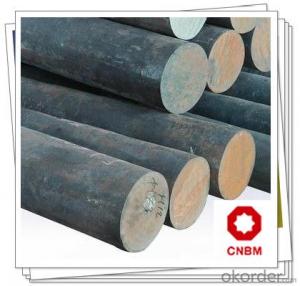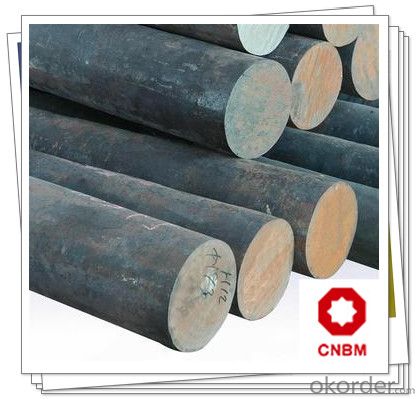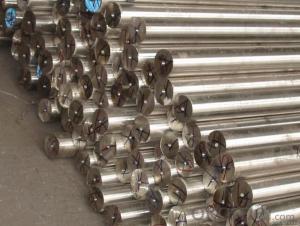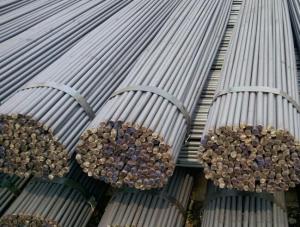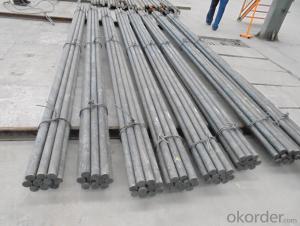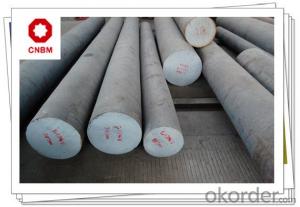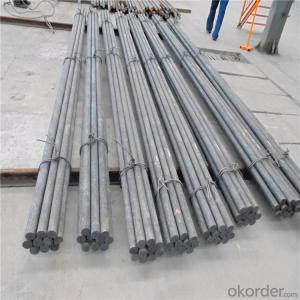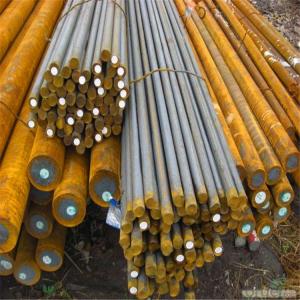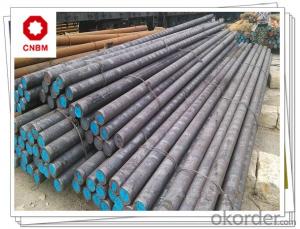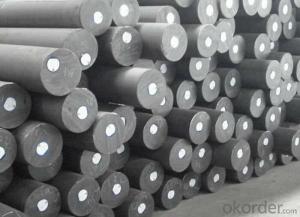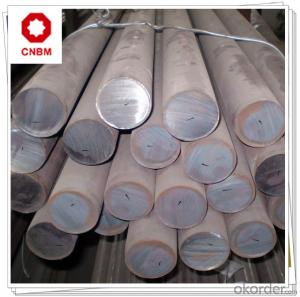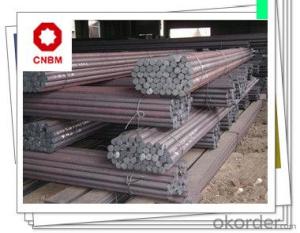Hot Rolled Carbon Steel Round Bars S20C
- Loading Port:
- Shanghai
- Payment Terms:
- TT OR LC
- Min Order Qty:
- 50 m.t.
- Supply Capability:
- 120000 m.t./month
OKorder Service Pledge
OKorder Financial Service
You Might Also Like
Hot Rolled Carbon Steel Round Bars S20C
Product Specification
1, Chemical Composition %
| Grade | C | Si | Mn | S | P | Cr | Ni | Cu |
| S20C | 0.08-0.23 | 0.15-0.35 | 0.30-0.60 | ≤0.030 | ≤0.030 | ≤0.20 | ≤0.25 | ≤0.25 |
2, Mechanical Properties
| Strength of Extension σb | Yield Strength σs | Elogation δ5 |
| ≥245 Mpa | ≥245 Mpa | ≥28% |
3, Diameter: 16mm - 300mm
Length: Max 12m
Application
Can be used to manufacture all kinds of machine parts with high tenacity but won't be subjected to large stress.
Can be used to manufacture carburizing and carbonitriding parts with high surface hardness in general machinery and automobile, agricultural machinery.
Product Main Points
1, Heat Treatment: normalizing, annealing, tempering, quenching
2, Surface Treatment: black, grinding, bright, polish
3, Product Process: hot rolled, cold drawn, forged
FAQ
1, Payment Terms:
30% T/T deposit & 70% T/T before delivery.
Irrevocable L/C at sight
2, Trade Terms:
EXW, FOB, CIF, CNF
3, Delivery Time:
Normally 30-40 days. According to quantity.
4, Manufacture or Trading Company:
CNBM is a state-owned fortune global 500 trading company. We have intergrated supply system.
There are about 20 overseas locations in different countries.
Product Show
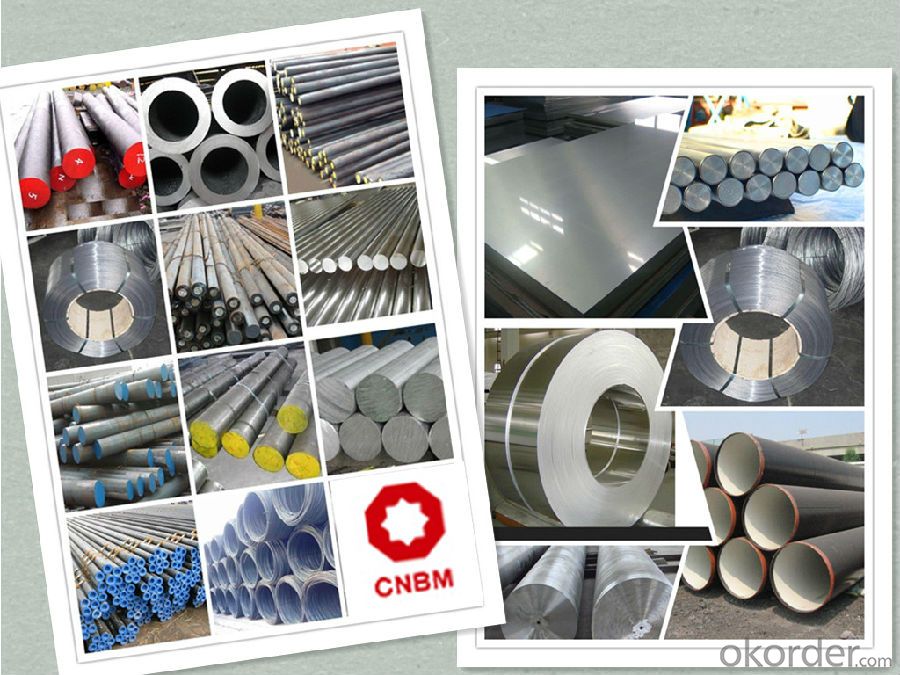
Work Shop
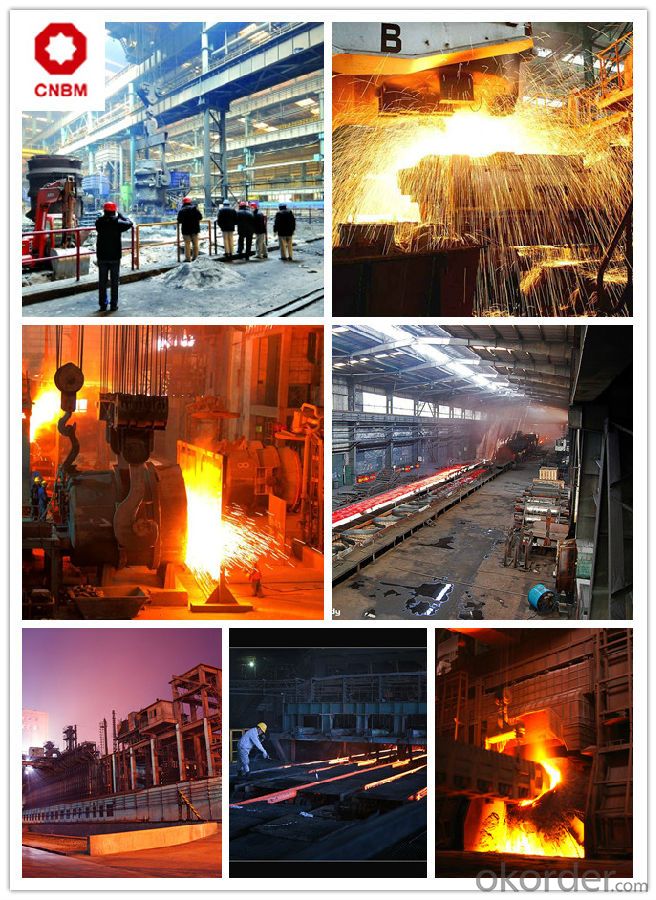
About Us

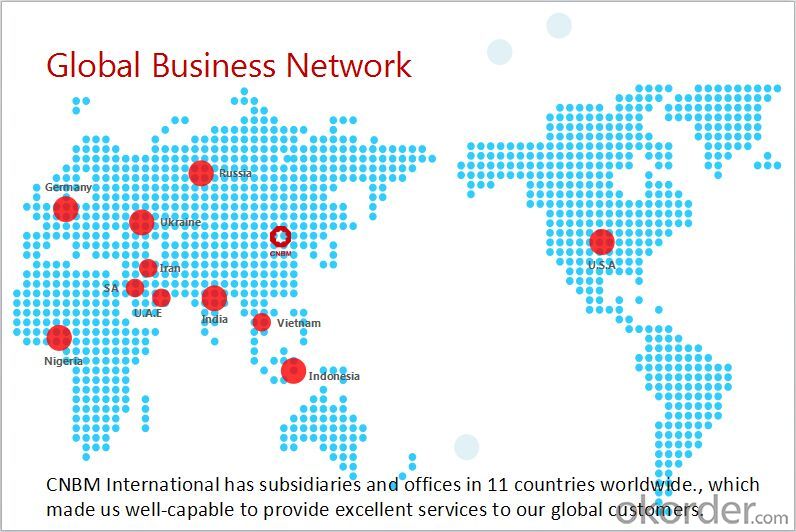
- Q: What are the different types of steel round bar profiles?
- There are several different types of steel round bar profiles available in the market. Some of the most common profiles include: 1. Plain Round Bar: This is the most basic and commonly used profile. It is a solid cylindrical bar with a smooth surface and uniform diameter throughout its length. 2. Deformed Round Bar: This type of round bar has deformations or ribs along its surface. These deformations provide better bonding with concrete when used in reinforced concrete structures, making it ideal for construction applications. 3. Hollow Round Bar: As the name suggests, this profile has a hollow center. It is often used in industries where weight reduction is important or where the round bar needs to be used as a conduit for fluids or gases. 4. Threaded Round Bar: This profile has threads along its length, allowing it to be easily screwed into other components. It is commonly used in applications where secure fastening or adjustability is required. 5. Half-Round Bar: This profile has a flat side and a rounded side, giving it a semi-circular shape. It is often used in decorative applications, such as handrails, where a sleek and aesthetically pleasing appearance is desired. 6. Square Bar: Although not strictly a round profile, square bars are often included in this category. These bars have four equal sides and are commonly used in applications where higher torsional strength is required. 7. Hexagonal Bar: Similar to square bars, hexagonal bars have six equal sides. They are often used in applications where high torque resistance is needed or when a distinctive appearance is desired. These are just some of the different types of steel round bar profiles available. The choice of profile depends on the specific application requirements, such as structural strength, bonding capabilities, or aesthetic considerations.
- Q: What are the different types of corrosion-resistant steel round bars?
- There are several different types of corrosion-resistant steel round bars available in the market. Some of the commonly used types include: 1. Stainless Steel Round Bars: Stainless steel is a popular choice for corrosion-resistant applications due to its high resistance to rust and corrosion. It contains chromium, which forms a protective oxide layer on the surface of the steel, preventing further corrosion. 2. Duplex Stainless Steel Round Bars: Duplex stainless steel is a type of stainless steel that contains a balanced combination of austenite and ferrite microstructures. This gives it excellent corrosion resistance, high strength, and good weldability. 3. Nitronic Stainless Steel Round Bars: Nitronic stainless steel is a high-performance alloy that offers superior corrosion resistance, high strength, and good ductility. It contains nitrogen, which enhances its resistance to pitting and crevice corrosion. 4. Alloy Steel Round Bars: Alloy steel is a type of steel that is alloyed with various elements to improve its properties. Some alloy steels, such as corrosion-resistant alloys (CRA), are specifically designed to resist corrosion in harsh environments. These alloys typically contain elements such as chromium, nickel, and molybdenum. 5. Aluminum Round Bars: While not technically steel, aluminum round bars are often used in applications where corrosion resistance is essential. Aluminum forms a protective oxide layer on its surface, which helps prevent corrosion. It is particularly suitable for applications where weight is a concern. 6. Copper-Nickel Round Bars: Copper-nickel alloys, such as Cu-Ni 90/10 and Cu-Ni 70/30, are widely used in marine and offshore applications due to their excellent resistance to seawater corrosion. These alloys have high strength, good ductility, and exceptional resistance to biofouling. These are just a few examples of the different types of corrosion-resistant steel round bars available. The choice of material depends on the specific application requirements, environmental conditions, and budget considerations. It is important to consult with a materials engineer or specialist to select the most suitable corrosion-resistant steel round bar for a particular application.
- Q: How do you calculate the weight of a steel round bar based on its length and volume?
- To calculate the weight of a steel round bar based on its length and volume, you need to know the density of the steel. The density represents the amount of mass per unit volume of the material. The formula to calculate the weight is: Weight = Volume × Density First, you need to calculate the volume of the steel round bar. The volume of a cylinder (which is the shape of a round bar) is given by the formula: Volume = π × (Radius)^2 × Length Where π is a mathematical constant approximately equal to 3.14, and Radius is the radius of the round bar. Once you have the volume, you can multiply it by the density of the steel to find the weight. The density of steel can vary depending on the specific type of steel being used. For example, the density of mild steel is around 7850 kg/m³. Therefore, the weight of the steel round bar is calculated as: Weight = Volume × Density For example, let's say we have a steel round bar with a length of 1 meter and a radius of 0.5 meters. To calculate the weight, we need to find the volume first: Volume = π × (0.5)^2 × 1 Volume = 0.7854 m³ Next, we multiply the volume by the density of steel: Weight = 0.7854 m³ × 7850 kg/m³ Weight = 6171.79 kg So, the weight of the steel round bar would be approximately 6171.79 kg.
- Q: Can steel round bars be used for making bicycle frames?
- Yes, steel round bars can be used for making bicycle frames. Steel is a popular material choice for bicycle frames due to its strength, durability, and ability to absorb vibrations. Steel round bars can be easily shaped and welded to create a sturdy and reliable frame for bicycles.
- Q: How do steel round bars perform under cyclic loading?
- Steel round bars generally perform well under cyclic loading due to their high strength and ductility. The ability of steel to withstand repeated loading and unloading without significant deformation or failure makes it suitable for applications where cyclic loading is present, such as in structural engineering, automotive components, and machinery. However, the performance of steel round bars under cyclic loading also depends on factors like the quality of the steel, design considerations, and the magnitude and frequency of the cyclic loading.
- Q: How are steel round bars used in the manufacturing of hydraulic systems?
- Due to their strength, durability, and versatility, steel round bars are widely used in the manufacturing of hydraulic systems. These bars serve multiple purposes in the construction and assembly of hydraulic components. One primary application of steel round bars in hydraulic systems is for fabricating piston rods. Piston rods are crucial components of hydraulic cylinders that transfer the force generated by the hydraulic fluid to the desired mechanism. The high strength and rigidity of steel round bars make them ideal for this purpose, as they can withstand the intense pressure and stress exerted on the piston rod during operation. Steel round bars are also utilized in manufacturing shafts and axles within hydraulic systems. These components transmit rotational motion and torque from the hydraulic pump to other mechanical parts, such as gears or pulleys. By using steel round bars, manufacturers can ensure the reliability and longevity of these critical parts, as they possess excellent mechanical properties and resistance to wear and tear. Moreover, steel round bars are often employed in constructing hydraulic fittings and connectors. These components join different hydraulic pipes, hoses, or valves together, creating a sealed system for fluid transmission. Steel round bars provide the necessary strength and stability to withstand the high-pressure conditions within hydraulic systems, ensuring leak-free operation and efficient fluid transfer. In conclusion, steel round bars play a vital role in the manufacturing of hydraulic systems by providing strength, durability, and versatility. Their use in piston rods, shafts, axles, fittings, and connectors ensures the proper functioning and reliability of these systems.
- Q: Can steel round bars be used in the production of fasteners?
- Indeed, the utilization of steel round bars is feasible when fabricating fasteners. In the realm of fastener production, steel round bars serve as a prevalent raw material, employed in the manufacturing of an array of fasteners such as bolts, screws, nuts, and studs. The circular nature of steel bars facilitates the machining and forming procedures essential for the creation of threaded or non-threaded fasteners. Steel is a favored choice for fasteners due to its robustness, longevity, and resistance to corrosion. Furthermore, steel round bars can be readily subjected to heat treatment, enhancing their mechanical attributes and rendering them suitable for a vast array of fastening applications across multiple industries.
- Q: What are the advantages of using nickel-iron alloy steel round bars?
- Nickel-iron alloy steel round bars offer several advantages. Firstly, they exhibit excellent corrosion resistance, making them suitable for applications in harsh environments. Additionally, these bars possess high mechanical strength and toughness, allowing them to withstand heavy loads and impacts. They also have good thermal stability, making them ideal for use in high-temperature applications. Moreover, nickel-iron alloy steel round bars have good magnetic properties, making them suitable for use in electromagnetic applications. Overall, the combination of corrosion resistance, mechanical strength, thermal stability, and magnetic properties make nickel-iron alloy steel round bars advantageous in various industrial applications.
- Q: Can steel round bars be used in the automotive manufacturing industry?
- Indeed, the automotive manufacturing industry does employ steel round bars. Due to its robustness, endurance, and adaptability, steel is a frequently employed material in this sector. Steel round bars find utility in numerous aspects of automotive manufacturing, including the creation of chassis, suspension components, drive shafts, and axles. These cylindrical bars exhibit excellent resistance to both impact and fatigue, rendering them suitable for withstanding the demanding requirements of the automotive industry. Furthermore, steel round bars can be conveniently shaped and manipulated, enabling customization and precise engineering in the manufacturing processes of automobiles. Consequently, steel round bars represent a dependable and extensively utilized material within the automotive manufacturing industry.
- Q: Are steel round bars recyclable?
- Yes, steel round bars are recyclable. Steel is one of the most commonly recycled materials in the world due to its high value and ease of recycling. When steel round bars reach the end of their useful life, they can be collected and sent to a recycling facility. At the recycling facility, the round bars are melted down and transformed into new steel products. This process can be repeated indefinitely without compromising the quality of the steel. Recycling steel round bars not only helps conserve natural resources and reduce waste but also saves energy and reduces greenhouse gas emissions compared to producing steel from raw materials.
Send your message to us
Hot Rolled Carbon Steel Round Bars S20C
- Loading Port:
- Shanghai
- Payment Terms:
- TT OR LC
- Min Order Qty:
- 50 m.t.
- Supply Capability:
- 120000 m.t./month
OKorder Service Pledge
OKorder Financial Service
Similar products
Hot products
Hot Searches
Related keywords
